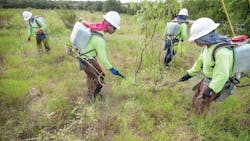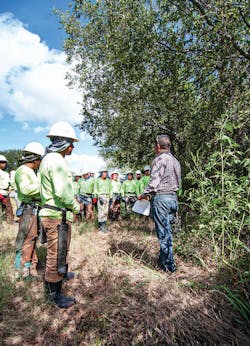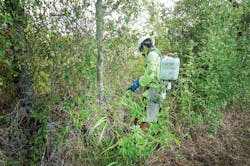The Next Chapter of IVM Unfolds for a Texas Co-op
When United Cooperative Services opted to take a more proactive approach with its vegetation management initiative, the utility saw a positive impact on communications with its members and their experiences with the organization. While the updated program yielded positive results in terms of improving service reliability and strengthening member relations, it was only the first phase of United’s larger vegetation management strategy.
During the second phase, United invested in an integrated vegetation management (IVM) program consisting of an extensive herbicide application — the first such application by the co-op. This new practice would address vegetation surrounding nearly 70% of its lines and the service reliability risks it posed to its 60,000-plus membership. The herbicide application began in late August 2019 and was completed by early September. A broad 360-mile stretch of 30-ft-wide cooperative right-of-way was selectively treated with a basal spray application — in only eight days.
During the second phase of its vegetation management program, United was able to accomplish a significant initiative that covered a broad swath of its service area and positively impacted many members in so little time.
Communication Focus
From United’s perspective, herbicide application is no small endeavor. Significant planning and communication were required not only to initiate the program but also educate the membership about the importance of treating vegetation in this manner. Just as with the first phase of its vegetation management program, United once again partnered with ACRT Inc. — its independent third-party consultants — to manage this program from start to finish, beginning with customer notifications.
Communication is at the center of everything the co-op does to foster trusted relationships with its members. To that end, sharing the story of its vegetation management initiatives helped United to further engage and inform members of the process and purpose of the program as well as encourage their involvement and support of it in the future.
The co-op began publishing articles on the topic in May 2019 and personally contacting members to explain the program, its importance and the utility’s commitment to completing it with as little environmental impact as possible. United explained when the applications would occur, and the team worked to secure their permission to spray along property lines.
The co-op provided this information early in the process because of the apprehension and misperceptions commonly associated with herbicide applications. For example, many consumers tend to believe all applications are done aerially. As such, they may expect a greater area to be impacted by the herbicides with minimal control. Thus, the applications could carry a higher risk of damaging consumer property and other vegetation not threatening power distribution. United’s program calls for basal application, where herbicide is applied to stems and trunks right above the soil line. It is a much more targeted, accurate method for applying herbicide and minimizes the environmental impact.
In addition to providing advance notice of the project, United also sought feedback in member focus groups and had ACRT representatives notify members in person about the program. This approach was the most essential communication component of the entire process. While United uses every communication medium at its disposal, it prefers face-to-face interaction with its members. Because its service territory in Texas has expanded to include more urban members, the extra effort it put forth in notifying members in person about the program proved to be an effective strategy. It also is one of the reasons the co-op effectively achieved zero member pushback.
Project Management
Clearing the path forward with members was just the first step. Identifying and managing the contractor performing the herbicide application was up next. For this, United leaned heavily on its vegetation management partner, which led the contractor bid meetings and communicated the sensitivity of this program as it pertained to members.
Ultimately, the selected contractor — R&E Forestry Inc. — already was working on another nearby utility system. United’s service territory was located between that project and R&E Forestry’s headquarters in Arkansas. Because United’s territory fell along the contractor’s return route, and because such a business opportunity was mutually beneficial to both companies from a timing standpoint, R&E Forestry was awarded the herbicide application work.
United’s vegetation management partner, ACRT, was instrumental not only in helping the co-op to identify the right contractor for the program but also in coordinating the logistics of the program. ACRT worked with R&E Forestry, which had its herbicide premixed and drop-shipped to United’s warehouse so it would be ready to go for spraying.
When the time came to start, R&E Forestry and ACRT conducted a tailgate meeting to review the work project map, indicating property owners who had opted out of vegetation treatment along their property lines. The tailgate session was thorough and, within eight business days, the work had been completed as planned and without incident.
For many utilities, vegetation spraying projects and the attention paid to them may pale among other priorities, until a problem arises. Because of United’s new proactive approach and its partner’s oversight, this was no longer a challenge for the co-op’s program. The partner managed the contractor closely, ensuring its work was accurate, the proper locations were being treated and its members continued to be informed. Out of all of United’s members who were directly and indirectly affected by the work that took place over the eight-day period, the co-op received only one member observation, that one of the crew trucks was perhaps too overloaded with workers to transport them safely.
While the results of the herbicide application may not be completely visible yet as of the time of this writing, what the co-op has achieved is a longer-term risk reduction. United has plans to begin managing larger vegetation treatments in future circuits, but, for now, its work has ensured improved service reliability for the future.
Clearing Vegetation
United not only invested in an herbicide application, but four years ago it also began exploring the concept of a major broadband fiber installation project for its residential members. The co-op employed a third-party consultant to provide a high-level overview of the program, what it would take and whether it was feasible. The project would cover 4300 of United’s 8000 miles of primary line and was estimated to take five years to complete.
In 2018, the utility began meeting with members in focus groups, at community meetings and during its annual meeting to report growing member sentiment for pursuing this project. Throughout this process, United was surprised to learn just how many members had inadequate internet service. After putting it to a vote, more than 90% of United’s membership voted in favor of pursuing the new service direction.
With that new charge, design work already had begun on this immense undertaking at the start of 2020. To prepare for the project ahead of time, United had to ensure vegetation was cleared near lines where fiber would be installed. The vegetation management work was aggressively underway well ahead of the first fiber-optic circuits planned for construction.
Every success celebrated at United, of which vegetation management surely is counted, can be attributed to the trust its members have in the co-op to protect their homes and businesses from service interruptions. The utility looks forward to sharing more success stories on its vegetation management program in the years to come.
About the Author
Mauri Montgomery
Mauri Montgomery is vice president of media and community relations for United Cooperative Services.


